2005.02.DD - Modern Drummer - Matt Sorum: On Top... Again (Matt, Slash)
Page 1 of 1
 2005.02.DD - Modern Drummer - Matt Sorum: On Top... Again (Matt, Slash)
2005.02.DD - Modern Drummer - Matt Sorum: On Top... Again (Matt, Slash)
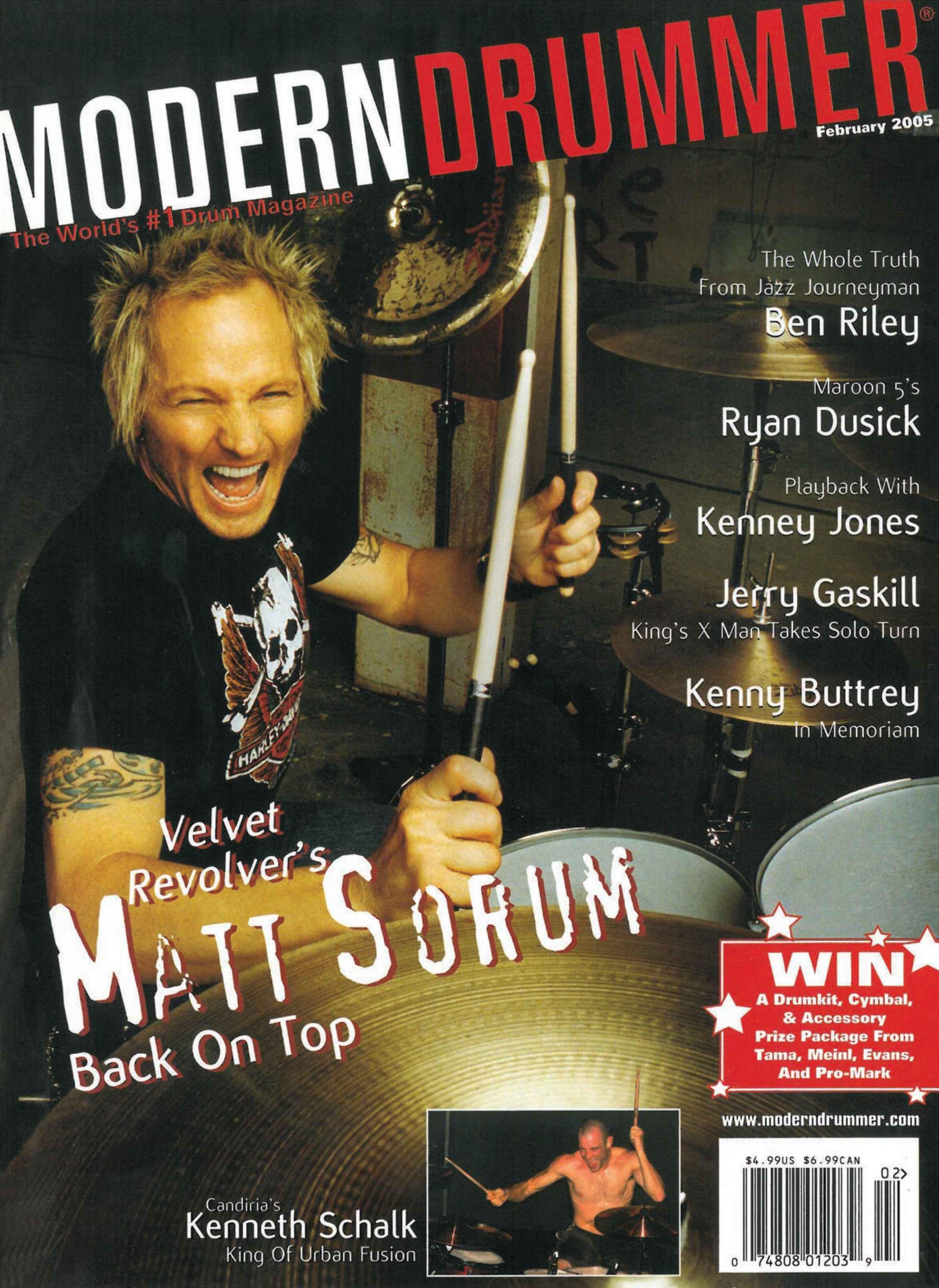
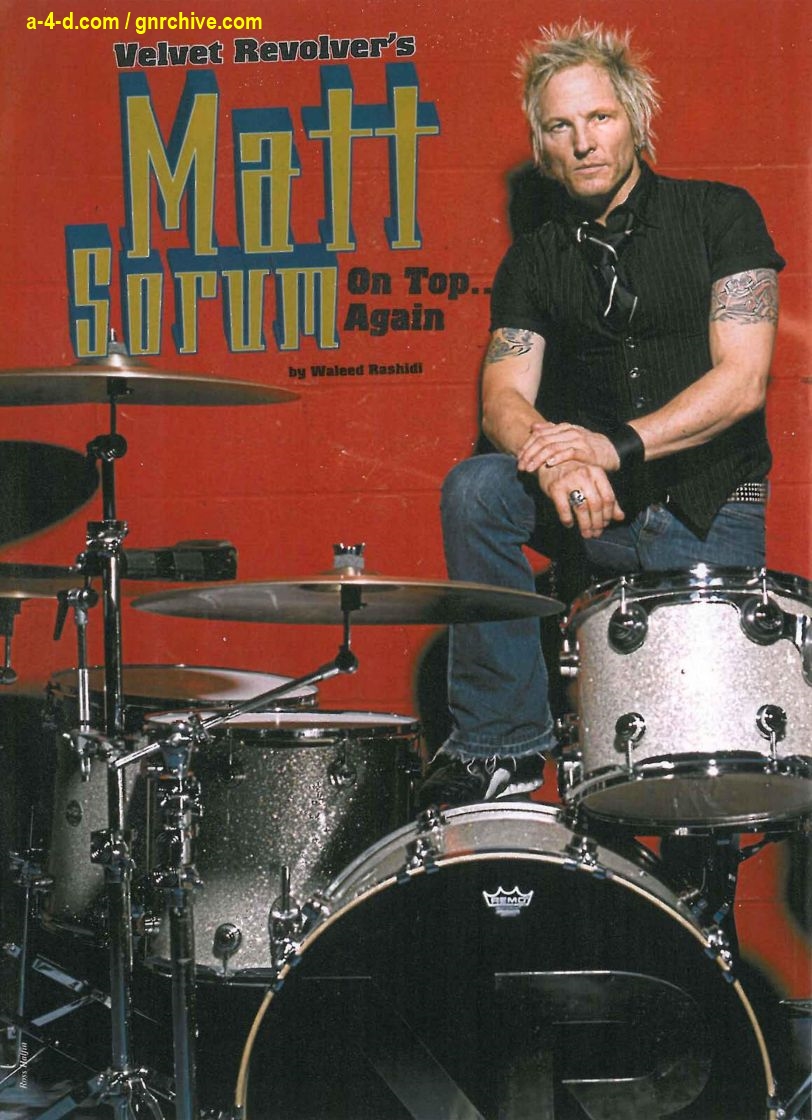
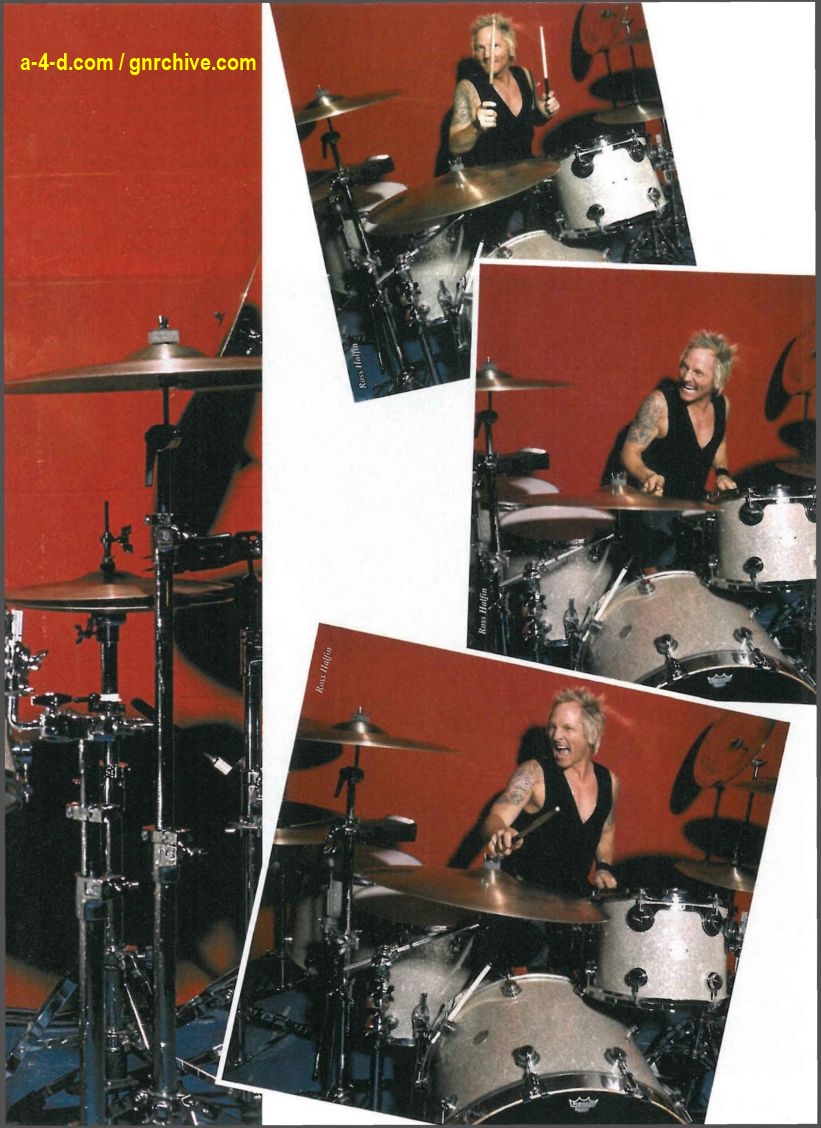
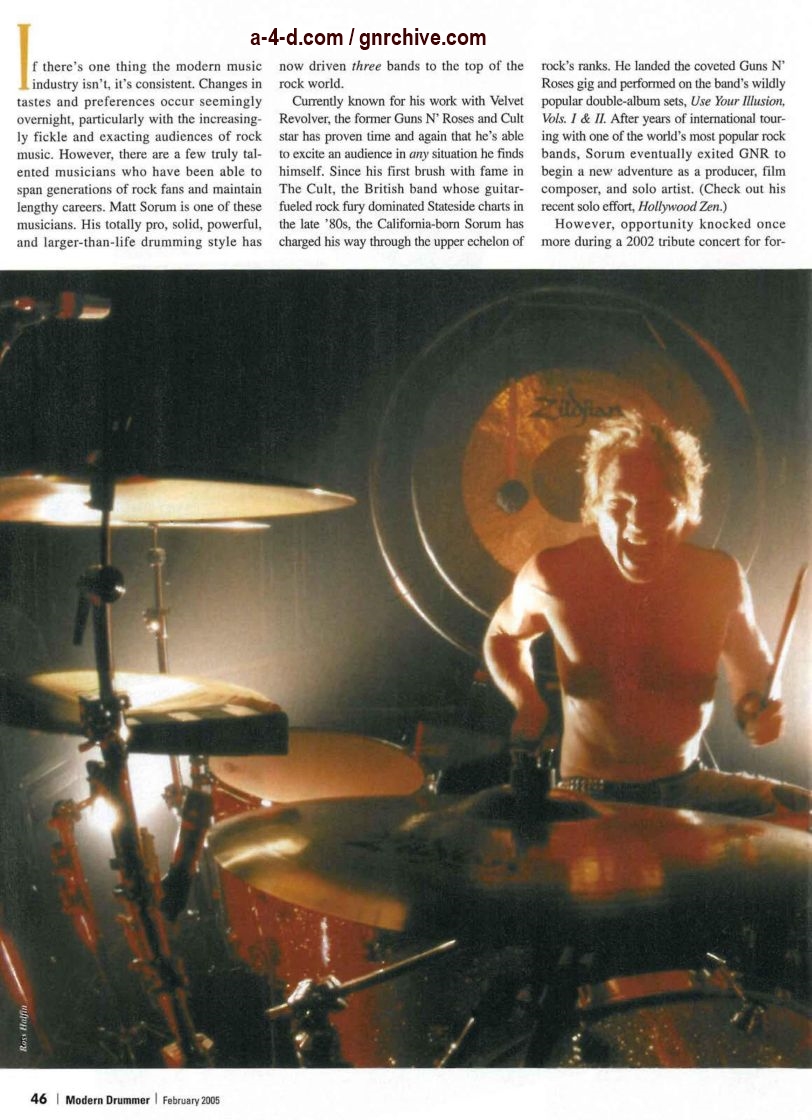

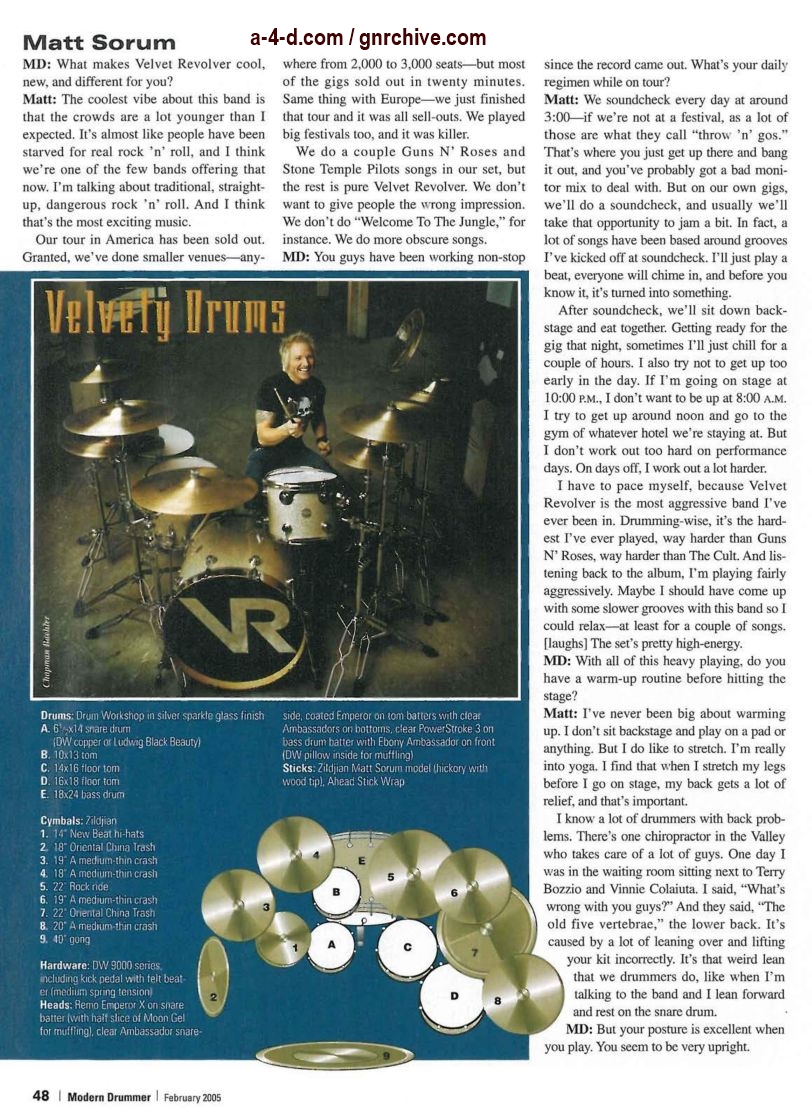
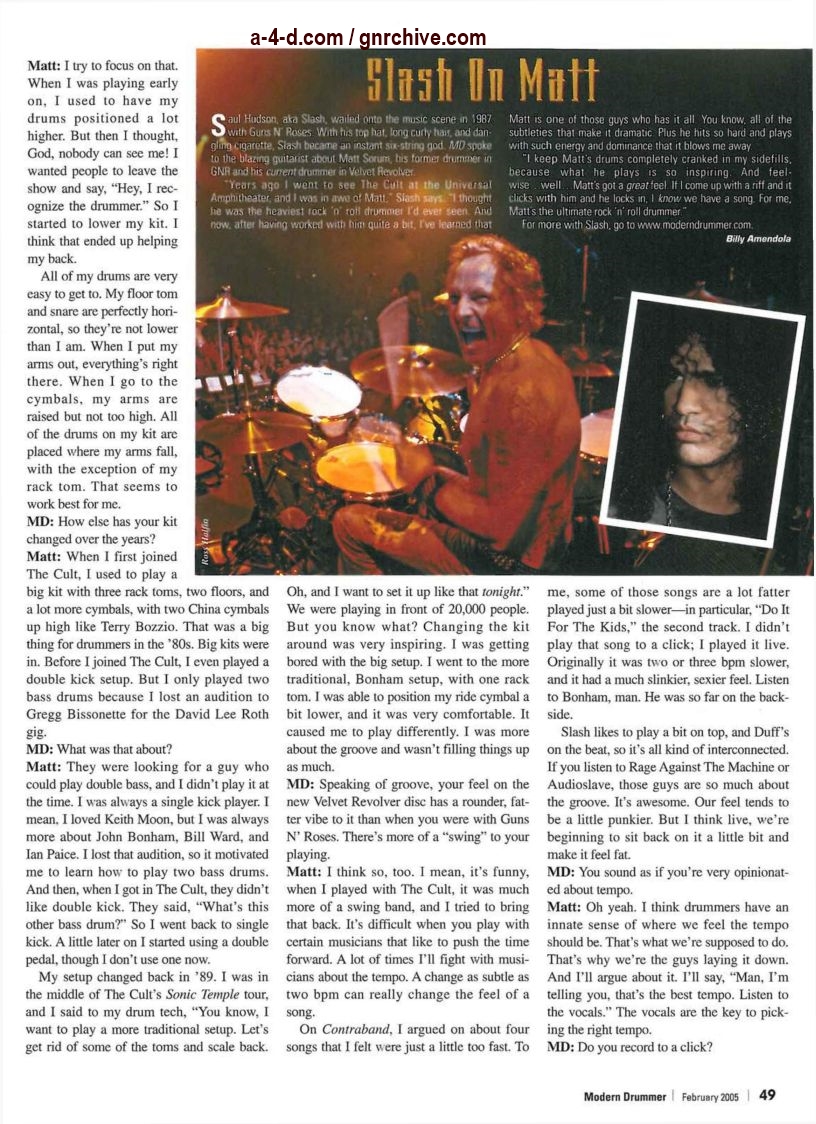
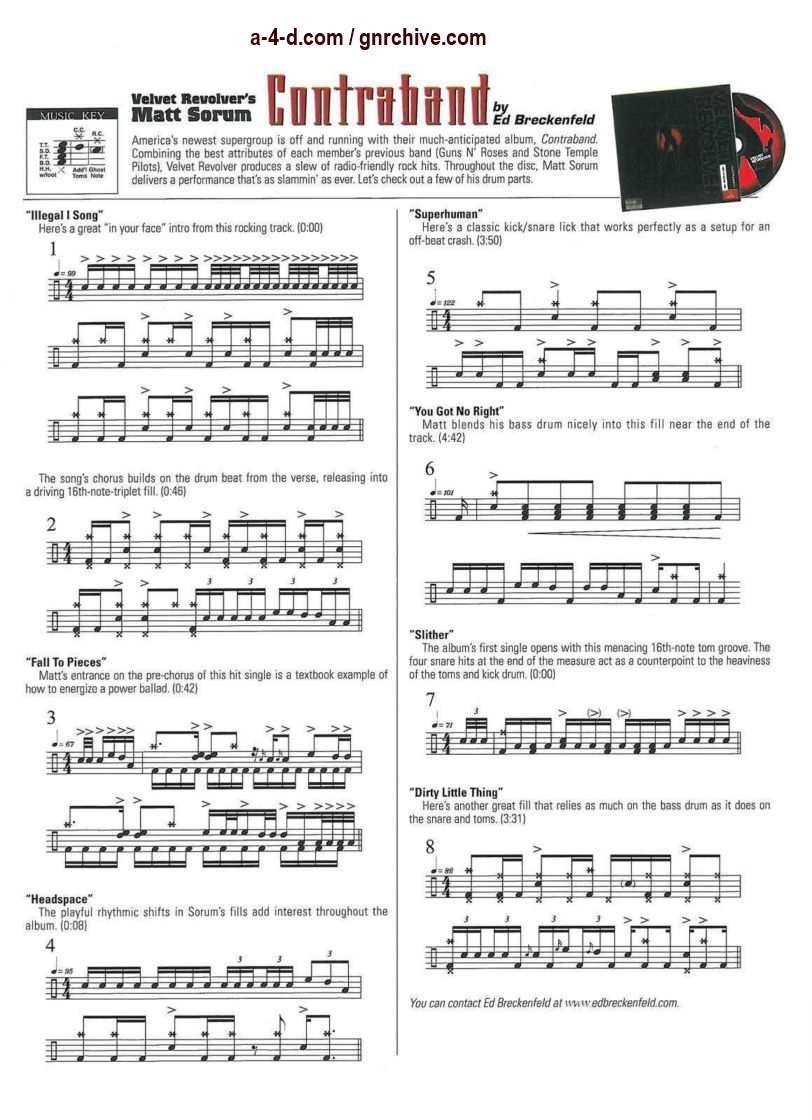
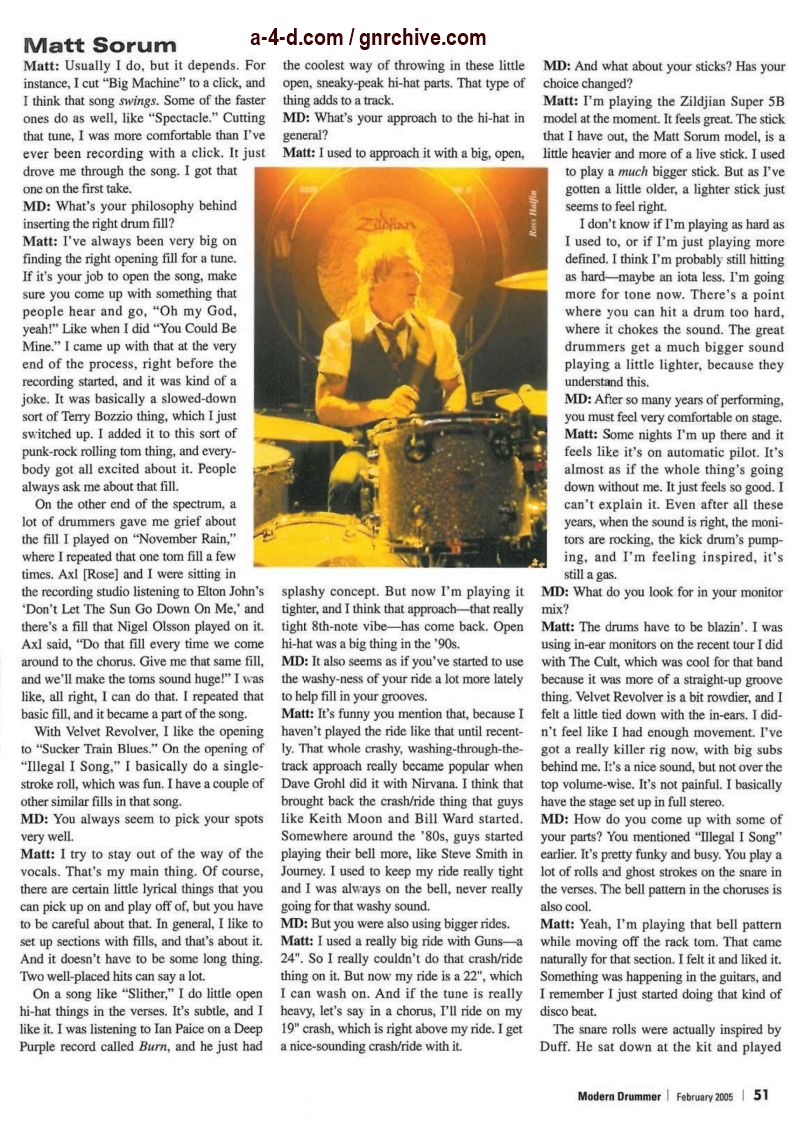
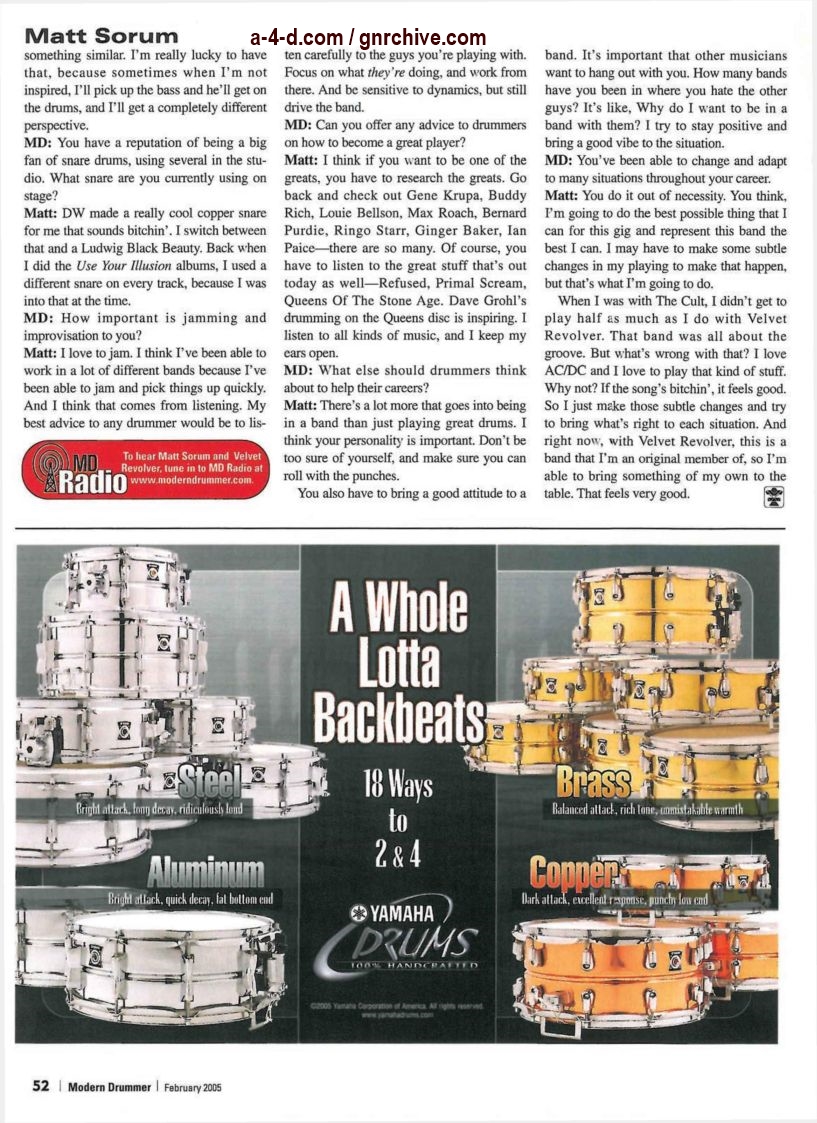
Transcript:
-------------------
Velvet Revolver's
Matt Sorum
On Top... Again
By Waleed Rashidi
If there’s one thing the modern music industry isn’t, it’s consistent. Changes in tastes and preferences occur seemingly overnight, particularly with the increasingly fickle and exacting audiences of rock music. However, there are a few truly talented musicians who have been able to span generations of rock fans and maintain lengthy careers. Matt Sorum is one of these musicians. His totally pro, solid, powerful, and larger-than-life drumming style has now driven three bands to the top of the rock world.
Currently known for his work with Velvet Revolver, the former Guns N’ Roses and Cult star has proven lime and again that he’s able to excite an audience in any situation he finds himself. Since his first brush with fame in The Cult, the British band whose guitar-fueled rock fury dominated Stateside charts in the late ’80s, the Califomia-born Sorum has charged his way through the upper echelon of rock’s ranks. He landed the coveted Guns N’ Roses gig and performed on the band’s wildly popular double-album sets, Use Your Illusion, Vols. I & II. After years of international touring with one of the world’s most popular rock bands, Sorum eventually exited GNR to begin a new adventure as a producer, film composer, and solo artist. (Check out his recent solo effort, Hollywood Zen.)
However, opportunity knocked once more during a 2002 tribute concert for former Ozzy Osbourne drummer Randy Castillo, who had passed away from cancer. At the show, Sorum regrouped with former Guns bandmates Slash and Duff McKagan. It was there that the three decided to put a new project together. After nine months of rehearsals and auditions, the threesome—along with guitarist Dave Kushner—recruited former Stone Temple Pilots vocalist Scott Weiland, and Velvet Revolver was born.
Immediately, Sorum was busy with the new project, initially working on a couple of film soundtracks. The first was for The Italian Job, for which Velvet Revolver did a cover of Pink Floyd’s “Money.” “That was really interesting to tackle,” says Sorum, “because it’s in seven. There’s not a lot you can do with the beat because the bass line is so predominant. But we kicked it up a couple of notches and rocked it a little harder. That was the first track we did with Scott, and it went really well.”
Next, Velvet Revolver was commissioned to create a cut for The Hulk. According to Matt, “It's based on a riff that I wrote, which ended up becoming a song called ‘Set Me Free.’”
The track got on the Internet, radio stations picked it up, and all of a sudden Velvet Revolver had a hit song—with no promotion and no label. RCA immediately inked the band to a deal, and the fivesome went into the studio with producer Josh Abraham to cut their debut, Contraband. “Josh had done a lot of records that we liked,” Sorum explains. “We produced the album with him—it was a 50/50 deal. We recorded to tape, I cut the drums in four days, and we finished the record before Christmas.” The album entered the charts at number-1 across the board.
A lot has changed in the music world since Sorum last released an album with his former Guns bandmates. But as Contraband's rampant success (and subsequent platinum status) has proved, Matt still has more than what it takes to keep himself relevant in the revolving door of rock.
MD: What makes Velvet Revolver cool, new, and different for you?
Matt: The coolest vibe about this band is that the crowds are a lot younger than I expected. It’s almost like people have been starved for real rock ’n’ roll, and I think we’re one of the few bands offering that now. I’m talking about traditional, straight-up, dangerous rock ’n’ roll. And I think that’s the most exciting music.
Our tour in America has been sold out. Granted, we’ve done smaller venues—anywhere from 2,000 to 3,000 seats—but most of the gigs sold out in twenty minutes. Same thing with Europe—we just finished that tour and it was all sell-outs. We played big festivals too, and it was killer.
We do a couple Guns N’ Roses and Stone Temple Pilots songs in our set, but the rest is pure Velvet Revolver. We don’t want to give people the wrong impression. We don’t do “Welcome To The Jungle,” for instance. We do more obscure songs.
MD: You guys have been working non-stop since the record came out. What’s your daily regimen while on tour?
Matt: We soundcheck every day at around 3:00—if we’re not at a festival, as a lot of those arc what they call “throw ’n’ gos.” That’s where you just get up there and bang it out, and you’ve probably got a bad monitor mix to deal with. But on our own gigs, we’ll do a soundcheck, and usually we’ll take that opportunity to jam a bit. In fact, a lot of songs have been based around grooves I’ve kicked off at soundcheck. I’ll just play a beat, everyone will chime in, and before you know it, it’s turned into something.
After soundcheck, we’ll sit down back-stage and eat together. Getting ready for the gig that night, sometimes I’ll just chill for a couple of hours. I also try not to get up too early in the day. If I’m going on stage at 10:00 p.m., I don’t want to be up at 8:00 a.m. I try to get up around noon and go to the gym of whatever hotel we’re staying at. But I don’t work out too hard on performance days. On days off, I work out a lot harder.
I have to pace myself, because Velvet Revolver is the most aggressive band I’ve ever been in. Drumming-wise, it’s the hardest I’ve ever played, way harder than Guns N’ Roses, way harder than The Cult. And listening back to the album, I’m playing fairly aggressively. Maybe I should have come up with some slower grooves with this band so I could relax—at least for a couple of songs, [laughs] The set’s pretty high-energy.
MD: With all of this heavy playing, do you have a warm-up routine before hitting the stage?
Matt: I’ve never been big about warming up. I don’t sit backstage and play on a pad or anything. But I do like to stretch. I’m really into yoga. I find that when I stretch my legs before I go on stage, my back gets a lot of relief, and that’s important.
I know a lot of drummers with back problems. There’s one chiropractor in the Valley who takes care of a lot of guys. One day I was in the waiting room sitting next to Terry Bozzio and Vinnie Colaiuta. I said, “What’s wrong with you guys?” And they said, “The old five vertebrae,” the lower back. It’s caused by a lot of leaning over and lifting your kit incorrectly. It’s that weird lean that we drummers do, like when I’m talking to the band and I lean forward and rest on the snare drum.
MD: But your posture is excellent when you play. You seem to be very upright.
Matt: I try to focus on that. When I was playing early on, I used to have my drums positioned a lot higher. But then I thought, God, nobody can see me! I wanted people to leave the show and say, “Hey, I recognize the drummer.” So I started to lower my kit. I think that ended up helping my back.
All of my drums are very easy to get to. My floor tom and snare arc perfectly horizontal, so they’re not lower than I am. When I put my arms out, everything’s right there. When I go to the cymbals, my arms are raised but not too high. All of the drums on my kit are placed where my arms fall, with the exception of my rack tom. That seems to work best for me.
MD: How else has your kit changed over the years?
Matt: When I first joined The Cult, I used to play a big kit with three rack toms, two floors, and a lot more cymbals, with two China cymbals up high like Terry Bozzio. That was a big thing for drummers in the ’80s. Big kits were in. Before I joined The Cult, I even played a double kick setup. But I only played two bass drums because I lost an audition to Gregg Bissonette for the David Lee Roth gig.
MD: What was that about?
Matt: They were looking for a guy who could play double bass, and I didn’t play it at the time. I was always a single kick player. I mean, I loved Keith Moon, but I was always more about John Bonham, Bill Ward, and Ian Paice. I lost that audition, so it motivated me to learn how to play two bass drums. And then, when I got in The Cult, they didn’t like double kick. They said, “What’s this other bass drum?” So I went back to single kick. A little later on I started using a double pedal, though I don’t use one now.
My setup changed back in ’89. I was in the middle of The Cult’s Sonic Temple tour, and I said to my drum tech, “You know, I want to play a more traditional setup. Let’s get rid of some of the toms and scale back. Oh, and I want to set it up like that tonight.” We were playing in front of 20,000 people. But you know what? Changing the kit around was very inspiring. I was getting bored with the big setup. I went to the more traditional, Bonham setup, with one rack tom. I was able to position my ride cymbal a bit lower, and it was very comfortable. It caused me to play differently. I was more about the groove and wasn’t filling things up as much.
MD: Speaking of groove, your feel on the new Velvet Revolver disc has a rounder, fatter vibe to it than when you were with Guns N’ Roses. There’s more of a “swing” to your playing.
Matt: I think so, too. I mean, it’s funny, when I played with The Cult, it was much more of a swing band, and I tried to bring that back. It’s difficult when you play with certain musicians that like to push the time forward. A lot of times I’ll fight with musicians about the tempo. A change as subtle as two bpm can really change the feel of a song.
On Contraband, I argued on about four songs that I felt were just a little too fast. To me, some of those songs are a lot fatter played just a bit slower—in particular, “Do It For The Kids,” the second track. I didn’t play that song to a click; I played it live. Originally it was two or three bpm slower, and it had a much slinkier, sexier feel. Listen to Bonham, man. He was so far on the backside.
Slash likes to play a bit on top, and Duff’s on the beat, so it’s all kind of interconnected. If you listen to Rage Against The Machine or Audioslave, those guys are so much about the groove. It’s awesome. Our feel tends to be a little punkier. But I think live, we’re beginning to sit back on it a little bit and make it feel fat.
MD: You sound as if you’re very opinionated about tempo.
Matt: Oh yeah. I think drummers have an innate sense of where we feel the tempo should be. That’s what we’re supposed to do. That’s why we’re the guys laying it down. And I’ll argue about it. I’ll say, “Man, I’m telling you, that’s the best tempo. Listen to the vocals.” The vocals are the key to picking the right tempo.
MD: Do you record to a click?
Matt: Usually I do, but it depends. For instance, I cut “Big Machine” to a click, and I think that song swings. Some of the faster ones do as well, like “Spectacle.” Cutting that tune, I was more comfortable than I’ve ever been recording with a click. It just drove me through the song. I got that one on the first take.
MD: What’s your philosophy behind inserting the right drum fill?
Matt: I’ve always been very big on finding the right opening fill for a tune. If it’s your job to open the song, make sure you come up with something that people hear and go, “Oh my God, yeah!” Like when I did “You Could Be Mine.” I came up with that at the very end of the process, right before the recording started, and it was kind of a joke. It was basically a slowed-down sort of Terry Bozzio thing, which I just switched up. I added it to this sort of punk-rock rolling tom thing, and everybody got all excited about it. People always ask me about that fill.
On the other end of the spectrum, a lot of drummers gave me grief about the fill I played on “November Rain,” where I repeated that one tom fill a few times. Axl [Rose] and I were sitting in the recording studio listening to Elton John’s ‘Don’t Let The Sun Go Down On Me,’ and there’s a fill that Nigel Olsson played on it. Axl said, “Do that fill every time we come around to the chorus. Give me that same fill, and we’ll make the toms sound huge!” I was like, all right, I can do that. I repeated that basic fill, and it became a part of the song.
With Velvet Revolver, I like the opening to “Sucker Train Blues.” On the opening of “Illegal I Song,” I basically do a singlestroke roll, which was fun. I have a couple of other similar fills in that song.
MD: You always seem to pick your spots very well.
Matt: I try to stay out of the way of the vocals. That’s my main thing. Of course, there are certain little lyrical things that you can pick up on and play off of, but you have to be careful about that. In general, I like to set up sections with fills, and that’s about it. And it doesn’t have to be some long thing. Two well-placed hits can say a lot.
On a song like “Slither,” I do little open hi-hat things in the verses. It’s subtle, and I like it. I was listening to Ian Paice on a Deep Purple record called Burn, and he just had the coolest way of throwing in these little open, sneaky-peak hi-hat parts. That type of thing adds to a track.
MD: What’s your approach to the hi-hat in general?
Matt: I used to approach it with a big, open, splashy concept. But now I’m playing it tighter, and I think that approach—that really tight 8th-note vibe—has come back. Open hi-hat was a big thing in the ’90s.
MD: It also seems as if you’ve started to use the washy-ness of your ride a lot more lately to help fill in your grooves.
Matt: It’s funny you mention that, because I haven’t played the ride like that until recently. That whole crashy, washing-through-the-track approach really became popular when Dave Grohl did it with Nirvana. I think that brought back the crash/ride thing that guys like Keith Moon and Bill Ward started. Somewhere around the ’80s, guys started playing their bell more, like Steve Smith in Journey. I used to keep my ride really tight and I was always on the bell, never really going for that washy sound.
MD: But you were also using bigger rides.
Matt: I used a really big ride with Guns—a 24". So I really couldn’t do that crash/ride thing on it. But now my ride is a 22", which I can wash on. And if the tune is really heavy, let’s say in a chorus, I’ll ride on my 19" crash, which is right above my ride. I get a nice-sounding crash/ride with it.
MD: And what about your sticks? Has your choice changed?
Matt: I’m playing the Zildjian Super 5B model at the moment. It feels great. The stick that I have out, the Matt Sorum model, is a little heavier and more of a live stick. I used to play a much bigger stick. But as I’ve gotten a little older, a lighter stick just seems to feel right.
I don’t know if I’m playing as hard as I used to, or if I’m just playing more defined. I think I’m probably still hitting as hard—maybe an iota less. I’m going more for tone now. There’s a point where you can hit a drum too hard, where it chokes the sound. The great drummers get a much bigger sound playing a little lighter, because they understand this.
MD: After so many years of performing, you must feel very comfortable on stage.
Matt: Some nights I’m up there and it feels like it’s on automatic pilot. It’s almost as if the whole thing’s going down without me. It just feels so good. I can’t explain it. Even after all these years, when the sound is right, the monitors are rocking, the kick drum’s pumping, and I’m feeling inspired, it’s still a gas.
MD: What do you look for in your monitor mix?
Matt: The drums have to be blazin’. I was using in-ear monitors on the recent tour I did with The Cult, which was cool for that band because it was more of a straight-up groove thing. Velvet Revolver is a bit rowdier, and I felt a little tied down with the in-ears. I didn’t feel like I had enough movement. I’ve got a really killer rig now, with big subs behind me. It’s a nice sound, but not over the top volume-wise. It’s not painful. I basically have the stage set up in full stereo.
MD: How do you come up with some of your parts? You mentioned “Illegal I Song” earlier. It’s pretty funky and busy. You play a lot of rolls and ghost strokes on the snare in the verses. The bell pattern in the choruses is also cool.
Matt: Yeah, I’m playing that bell pattern while moving off the rack tom. That came naturally for that section. I felt it and liked it. Something was happening in the guitars, and I remember I just started doing that kind of disco beat.
The snare rolls were actually inspired by Duff. He sat down at the kit and played something similar. I’m really lucky to have that, because sometimes when I’m not inspired, I’ll pick up the bass and he’ll get on the drums, and I’ll get a completely different perspective.
MD: You have a reputation of being a big fan of snare drums, using several in the studio. What snare are you currently using on stage?
Matt: DW made a really cool copper snare for me that sounds bitchin’. I switch between that and a Ludwig Black Beauty. Back when I did the Use Your Illusion albums, I used a different snare on every track, because I was into that at the time.
MD: How important is jamming and improvisation to you?
Matt: I love to jam. I think I’ve been able to work in a lot of different bands because I’ve been able to jam and pick things up quickly. And I think that comes from listening. My best advice to any drummer would be to listen carefully to the guys you’re playing with. Focus on what they're doing, and work from there. And be sensitive to dynamics, but still drive the band.
MD: Can you offer any advice to drummers on how to become a great player?
Matt: I think if you want to be one of the greats, you have to research the greats. Go back and check out Gene Krupa, Buddy Rich, Louie Bellson, Max Roach, Bernard Purdie, Ringo Starr, Ginger Baker, Ian Paice—there are so many. Of course, you have to listen to the great stuff that’s out today as well—Refused, Primal Scream, Queens Of The Stone Age. Dave Grohl’s drumming on the Queens disc is inspiring. I listen to all kinds of music, and I keep my ears open.
MD: What else should drummers think about to help their careers?
Matt: There’s a lot more that goes into being in a band than just playing great drums. I think your personality is important. Don’t be too sure of yourself, and make sure you can roll with the punches.
You also have to bring a good attitude to a band. It’s important that other musicians want to hang out with you. How many bands have you been in where you hate the other guys? It’s like, Why do I want to be in a band with them? I try to stay positive and bring a good vibe to the situation.
MD: You’ve been able to change and adapt to many situations throughout your career.
Matt: You do it out of necessity. You think, I’m going to do the best possible thing that I can for this gig and represent this band the best I can. I may have to make some subtle changes in my playing to make that happen, but that’s what I’m going to do.
When I was with The Cult, I didn’t get to play half as much as I do with Velvet Revolver. That band was all about the groove. But what’s wrong with that? I love AC/DC and I love to play that kind of stuff. Why not? If the song’s bitchin’, it feels good. So I just make those subtle changes and try to bring what’s right to each situation. And right now, with Velvet Revolver, this is a band that I’m an original member of, so I’m able to bring something of my own to the table. That feels very good.
***
Slash On Matt
Saul Hudson, aka Slash wailed onto the music scene in 1987 with Guns N' Roses. With his top hat, long curly hair, and dan-gling cigarette, Slash became an instant six-string god MD spoke to the blazing guitarist about Matt Sorum, his former drummer in GNR and his current drummer in Velvet Revolver.
"Years ago I went to see the Cult at the Universal Amphitheater, and I was in awe of Matt," Slash says. "I thought he was the heaviest rock 'n' roll drummer I'd ever seen. And now, after having worked with him quite a bit, I've teamed that Matt is one of those guys who has it all. You know, all of the subtleties that make it dramatic Plus he hits so hard and plays with such energy and dominance that it blows me away.
"I keep Matt's drums completely cranked in my sidefills, because what he plays is so inspiring. And feel-wise... well... Matt's got a great feel If I come up with a riff and it clicks with him and he locks in, I know we have a song. For me, Matt's the ultimate rock 'n' roll drummer."
Billy Amendola

Blackstar- ADMIN
- Posts : 13902
Plectra : 91332
Reputation : 101
Join date : 2018-03-17
 Similar topics
Similar topics» 2001.09.DD - Modern Drummer - Matt Sorum: Surviving Super Stardom
» 1991.06.DD - Modern Drummer - Matt Sorum: Guns N' Roses' New Stickman
» 2004.07.DD - Modern Drummer - Welcome To The Rumble (Matt)
» 2022.05.26 - The Modern Drummer Podcast - Interview with Matt
» 2021.08.27 - Billboard - 'Talkin’ Jive' (And Fatherhood) With Drummer Matt Sorum
» 1991.06.DD - Modern Drummer - Matt Sorum: Guns N' Roses' New Stickman
» 2004.07.DD - Modern Drummer - Welcome To The Rumble (Matt)
» 2022.05.26 - The Modern Drummer Podcast - Interview with Matt
» 2021.08.27 - Billboard - 'Talkin’ Jive' (And Fatherhood) With Drummer Matt Sorum
Page 1 of 1
Permissions in this forum:
You cannot reply to topics in this forum
